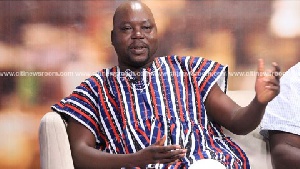The Government of Ghana through the Trade Ministry should development policies to scale up export of as part of moves to strengthen the local currency, Executive Secretary of the Importers and Exporters Association of Ghana, Sampson Awingobit, has said.
He indicated that export of goods and services will ensure that the country earns enough foreign exchange, a situation he believed will ease the pressure on the cedi.
He was commenting on the formation of the Forex Committee by the Finance Ministry to deal with issues causing the fall of the cedi against the dollar. He said the formation of the committee was needless because that is not the immediate solution to the current woes of the cedi.
The local currency has over the period struggled against the major trading currencies especially the dollar. As part of moves to address the problem, last week, the FX Committee was announced by a Deputy Finance Minister, Charles Adu Boahen.
But reacting to this development, Mr Awingobit said an Accra-based Class FM Tuesday January 21 that : “We have the Bank of Ghana which looks at monetary policy, we have the Ministry of Finance which also looks at fiscal policies. So now, the BoG and the Ministry of Finance have to work in coherent.”
“Are you telling me that the BoG is not aware of the group of people on the Black Market that when the BoG sets the daily rate for the banks, the banks also turn to direct people to go to the black market to trade?”, he continued.
“Is this committee coming to say arrest the Aljhajis at the black market and prosecute them? The BoG is aware of these issues, they know about these things happening on the black market.
Prescribing another solution, he said “We need to look at our manufacturing aspect, we need to look at export. Currently we are lacking in export. We don’t have so much non-traditional commodities that we are exporting. We need to go to the non-traditional ones more.”
Meanwhile, an economist Mr Kwame Pianim has said the formation of the Forex Committee was needless.
In his opinion, members of the Committee are busy with their other assignments, hence will not have time to perform the new roles assign to them in respect of the Committee’s work.
Speaking in an interview with Accra-based Citi FM on the station’s Eyewitness News programme on Monday, 20 January 2019, he said the committee should be dissolved.
“The committee is made up of some very competent people”, he observed, “but they are too busy”, he noted, explaining: “The Minister of Agriculture should be busy transforming agriculture, the Minister of Trade should be busy sitting down with industry to decide the trade protocols.”
“I cannot see them contributing to anything”, he foretold, insisting: “Let’s dissolve it”.
“A forty-member committee, are we serious?” the stalwart of the governing New Patriotic Party (NPP) wondered.
“In the fourth year of this administration? We don’t need ideas, we’ve had ideas – aviation hub, we’ve had it; financial services during Kufuor’s time, we discussed it, Barclays was involved”, Mr Pianim recalled, stressing that what the government needs to do in the last year of its four-year term is “action, action, action”.
“If I see this committee, it seems like a public relations stunt; we are not interested in a public relations stunt. These people [committee members] are too busy. This 40-member committee, look at them, they are busy people. They are managing banks, managing ministries; what time do they have? This committee, if it’s a public relations stunt, that’s fine; if it’s eye service, that’s fine; but I cannot see them contributing to anything.
“Dissolve it. We don’t need it. What is it for? They are going to meet; we spend the little money we don’t have making tea for them? What are they going to do?” He asked.
“We, in Ghana, are beginning to talk as if a stable cedi is the litmus [test] for sound economic management. We should get away from that nonsense. … A stable currency is not necessarily good. You need it to be flexible and that’s why we had a fixed exchange rate, it took President Rawlings a long time moving us from a market-determined economy to a reasonably market-oriented economy to change … We have the floating exchange, fixed exchange and then now we have a managed float, so, I do not understand why anybody thinks you have a cure for exchange rate development – the movement in the exchange rate”.
Business News of Tuesday, 21 January 2020
Source: laudbusiness.com

















